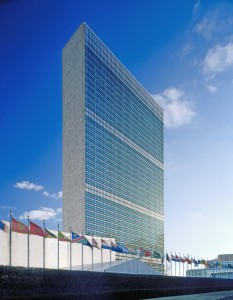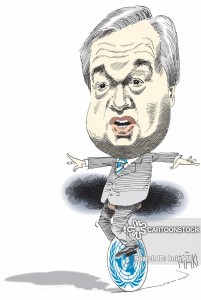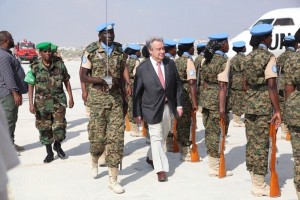Secretary-General of the United Nations
Roles and responsibilities
Magazine Desk
“The United Nations cannot prosper, nor can its aims be realised without the active and steadfast support of the people of the world. The aims and activities of the General Assembly, the Security Council, the Economic and Social Council will, no doubt, be represented before the public primarily by the Chairmen of these organs. But the Secretary-General, more than anyone else, will stand for the United Nations as a whole. In the eye of the world, no less than in the eyes of his own staff, he must embody the principles and ideals of the Charter to which the organisation seeks to give effect.”
— Report of the Preparatory Commission of the United Nations 1945-1946
The Secretary-General is a symbol of the United Nations ideals and a spokesperson for the interests of the world’s peoples, in particular the poor and vulnerable. They can be described best as equal parts diplomat and advocate, civil servant and Chief Executive Officer. Although the Secretary-General works within diverse political medium represented by the deliberative organs of the UN, he is nevertheless expected to act as an impartial agent, who, in person or through special missions, observers, mediators, and facilitators uses his powers and influence to promote compromise and conciliation among nations. But what exactly is the nature of the powers and influence of the UN Secretary-General? Lets’ find out
Introduction
The first secretary-general, Trygve Lie, called it the most difficult job in the world. Some of the difficulty lies in the job description. Former US President Franklin D. Roosevelt, several years before the United Nations’ creation, saw the secretary-general’s role as that of a “world moderator.” The UN charter, however, refers to the secretary-general as the body’s “chief administrative officer.” Each of the nine secretaries to date has tended to favor one of these roles. Kofi Annan (1997–2006), for example, was considered an activist, ‘world moderator’–style secretary-general and won a Nobel Peace Prize. His successor, Ban Ki-moon (2007–2016), was seen as more of an administrator, and he successfully pushed forward the Paris Agreement and increased the number of women in UN senior management. The current secretary-general, Antonio Guterres, is focused on advancing sustainable development and regulating digital technologies.
What UN Charter says?
The UN Charter, the foundational treaty of the United Nations, describes the secretary-general as the organization’s “chief administrative officer,” who shall act in that capacity and perform “such other functions as are entrusted” to him or her by the Security Council, General Assembly, Economic and Social Council and other United Nations organs. Beyond that, the leader’s desired qualities, candidate-selection process, and length of tenure were left open to interpretation.
Appointment
The Security Council recommends a candidate for the General Assembly’s 193 members to appoint. Although all UN members get a voice in the secretary-general’s selection, the five permanent members of the Security Council hold the most influence. Any one of them can eliminate a nominee with a veto. For example, China vetoed a third term for the fourth secretary-general, Austria’s Waldheim, while the United States vetoed a second term for the fifth, Egypt’s Boutros-Ghali. Although the ten elected members of the Security Council do not have veto power, their votes are still crucial, as candidates need at least nine votes to be recommended as secretary-general.
Secretaries-general usually come from countries considered to be small- or medium-sized neutral powers. To date, all appointees have been male career diplomats. They generally serve no more than two five-year terms. Although a national from an Eastern European country has yet to hold the seat, regional rotation is observed. The five permanent members of the Security Council—China, France, Russia, the United Kingdom, and the United States—by custom avoid nominating their nationals.
Responsibilities
- Administrative
The secretary-general oversees the UN Secretariat, which functions as the United Nations’ executive office and handles operations, including research, translation, and media relations. The Secretariat has a staff of more than 38,000 people from 187 countries. Each secretary-general has handled his administrative responsibilities differently. Hammarskjold established a system of offices in charge of legal, political, personnel, and budgetary aspects of the secretariat, while Boutros Boutros-Ghali (1992–1996) added undersecretaries-general to oversee operations. During Annan’s administration, the deputy secretary-general position was created to handle day-to-day operations. Under Guterres, the protocol for delegating authority in the Secretariat was revised and two new management departments were created.
- Human Resources
The secretary-general appoints undersecretaries for approximately fifty UN posts, including the heads of funds such as the UN Children’s Fund (UNICEF) and UN Development Program (UNDP). An important aspect of the appointment process involves lobbying efforts by member states to fill these posts with their nationals, highlighting the secretary-general’s role in ensuring broad regional representation in UN leadership
- Peacekeeping
The secretary-general’s office oversees peacekeeping missions and appoints the undersecretary in charge of that department, involving some fourteen operations worldwide as of 2019. While the General Assembly or Security Council may initiate a peacekeeping mission (though the General Assembly has only done so once), operational control rests with the Secretariat. Guterres has introduced several reforms to the UN peace and security framework, including the creation of the Department of Political and Peacebuilding Affairs and the Department of Peace Operations.
- Mediation
As part of the “good offices” responsibility of the position, the secretary-general practices independence and impartiality to prevent and limit conflict. Examples of UN leaders taking on mediation roles in the past include Hammarskjold’s promotion of an armistice between Israel and Arab states and Javier Perez de Cuellar’s (1982–1991) negotiation of a cease-fire to end the Iran-Iraq War. The secretary-general also appoints envoys charged with brokering peace deals. Such envoys report to the Security Council, and their appointments can be influenced by the preferences of the council’s members. In February 2017, for example, the United States objected to Guterres’s appointment of former Palestinian Prime Minister Salam Fayyad as envoy to Libya. The intervention raised the question of whether such appointments are subject to approval by the Security Council, even if the UN Charter authorizes the secretary-general to make the decision.
The secretary-general is required to uphold the values of the United Nations, even at the risk of challenging member states. The Charter also empowers the Secretary-General to “bring to the attention of the Security Council any matter which in his opinion may threaten the maintenance of international peace and security”. These guidelines both define the powers of the office and grant it considerable scope for action. The Secretary-General would fail if he did not take careful account of the concerns of Member States, but he must also uphold the values and moral authority of the United Nations, and speak and act for peace, even at the risk, from time to time, of challenging or disagreeing with those same Member States.
Mediator
One of the Secretary-General’s most important roles is the ability to use his good office to serve as a mediator in conflict situations. While the Security Council authorises the peacekeeping missions and the General Assembly approves fund, it is the Secretary-General who often plays the essential role of engaging with and mediating between the conflicting parties. But the basic duties of the Secretary-General are comprised in attending sessions of UN bodies; consulting with world leaders, governments and others; and carrying out country visit to meet with people, stayed informed on issues and report on various conditions. He, thus, issues an annual report on the work of the UN which appraises its activities and outlines future priorities.
As a legal actor
On the face of it, it would seem that the UN Charter does not clearly spell out the roles or powers of the Secretary-General of the Organisation. Thus, Article 7 simply prepares the ground for his pre-eminence by listing the Secretariat, where he presides as the chief administrative officer, among the 6 “principal organs” of the United Nations. Following this is Article 97 which merely describes him as the “chief administrative officer” of the UN. It must be pointed out however that he is not merely the chief administrative officer of the Secretariat; he is indeed the “chief administrative officer” of the UN as a whole. Article 98 goes further than that by providing that he may be entrusted with “other functions” by the main intergovernmental bodies- other deliberative organs of the UN. Article 99 however authorises him to bring to the attention of the Security Council “any matter which in his opinion may threaten the maintenance of international peace and security.” Article 100 secures his independence by shielding him from any influence that is external to the UN itself. In sum, therefore, the legal basis of the authority and/or roles of the Secretary-General can be said to lie in Articles 7, 97 and 98 through 101 of the UN Charter.
As a political and moral actor
The roles of the Secretary-General have varied with the individual occupant of that prestigious office and the time and circumstances in the world besetting his headship of the Secretariat. the political influence that the Secretary-General exerts both within and without the interpretive environment, depends, to a very large extent, not on any material power from the Charter but on the authority he is able to command using the instrument of persuasion and the cult of his personality. Indeed, The Secretary-General’s ability to influence global affairs often depends on how the international community regards his moral authority. In relation to such moral authority, past secretaries-general have drawn on their own ethics and religious backgrounds—as diverse as Lutheranism, Catholicism, Buddhism, and Coptic Christianity—to guide the role that they played in addressing the UN’s goals in the international arena, such as the maintenance of international peace and security and the promotion of human rights.
The Secretary-General’s ability to persuade and hence influence global affairs also depends, no less, on the formal authority of the office and in part on the normative acceptability of positions he pushes or takes. His political and moral authority is therefore not exclusive from his legal role.
 Relationship with the Security Council
Relationship with the Security Council
The secretary-general is tasked with upholding the interests of underrepresented states and balancing the demands of the Security Council with those of General Assembly members. The relationship between the Security Council’s five permanent members and the secretary-general is similar to one between constituents and their elected representatives.
 Jahangir's World Times First Comprehensive Magazine for students/teachers of competitive exams and general readers as well.
Jahangir's World Times First Comprehensive Magazine for students/teachers of competitive exams and general readers as well.





